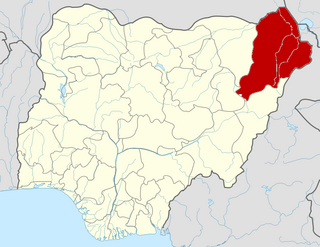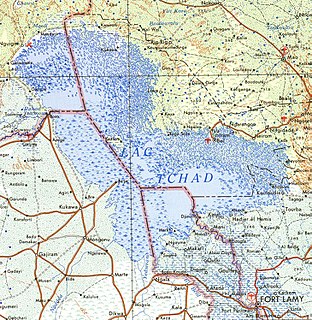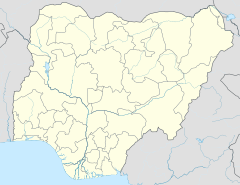Maiduguri is the capital and the largest city of Borno State in north-eastern Nigeria. The city sits along the seasonal Ngadda River which disappears into the Firki swamps in the areas around Lake Chad. Maiduguri was founded in 1907 as a military outpost by the British and has since grown rapidly with a population exceeding a million by 2007.

Borno State is a state in the North-East geopolitical zone of Nigeria, bordered by Yobe to the west, Gombe to the southwest, and Adamawa to the south while its eastern border forms part of the national border with Cameroon, its northern border forms part of the national border with Niger, and its northeastern border forms all of the national border with Chad, being the only Nigerian state to border three foreign countries. It takes its name from the historic emirate of Borno, with the emirate's old capital of Maiduguri serving as the capital city of Borno State. The state was formed in 1976 when the former North-Eastern State was broken up. It originally included the area that is now Yobe State, which became a distinct state in 1991.

The 2009 Boko Haram uprising was a conflict between Boko Haram, a militant Islamist group, and Nigerian security forces. Violence across several states in northeastern Nigeria resulted in more than 1,000 dead, with around 700 killed in the city of Maiduguri alone, according to one military official.

Boko Haram, officially known as Jamā'at Ahl as-Sunnah lid-Da'wah wa'l-Jihād, is a terrorist organization based in northeastern Nigeria, which is also active in Chad, Niger and northern Cameroon. In 2016, the group split, resulting in the emergence of a hostile faction known as the Islamic State's West Africa Province.
Marte is a Local Government Area of Borno State, Nigeria, on the western coast of Lake Chad. Its headquarters are in the town of Marte

Gwoza is a local government area of Borno State, Nigeria. Its headquarters are in the town of Gwoza, a border town "about 135 kilometres South-East of Maiduguri." The postal code of the area is 610.

The Boko Haram insurgency began in July 2009, when the militant Islamist and jihadist rebel group Boko Haram started an armed rebellion against the government of Nigeria. The conflict takes place within the context of long-standing issues of religious violence between Nigeria's Muslim and Christian communities, and the insurgents' ultimate aim is to establish an Islamic state in the region.
Baga is a town in the northeastern Nigerian state of Borno, close to Lake Chad, and lying northeast of the town of Kukawa. It is located within the Kukawa Local Government Area.
The Baga massacre began on 16 April 2013 in the village of Baga, Nigeria, in Borno State, when as many as 200 civilians were killed, hundreds wounded, and over 2,000 houses and businesses worth millions of Naira were destroyed. Refugees, civilians officials, and human rights organizations accused the Nigerian Military of carrying out the massacre; some military officials blamed the insurgent group Boko Haram.
Timeline of the Boko Haram insurgency is the chronology of the Boko Haram insurgency, an ongoing armed conflict between Nigerian Islamist group Boko Haram and the Nigerian government. Boko Haram have carried out many attacks against the military, police and civilians since 2009, mostly in Nigeria. The low-intensity conflict is centred on Borno State. It peaked in the mid 2010s, when Boko Haram extended their insurgency into Cameroon, Chad and Niger.
The Konduga massacre took place in Konduga, Borno State, Nigeria on 11 February 2014. The massacre was conducted by Boko Haram Islamists against Christian villagers. At least 62 people were killed.
The January 2014 Northern Nigeria attacks were a set of terrorist massacres that occurred in January 2014 at Kawuri, Borno state and in Chakawa village, Madagali Local Government Area, Adamawa State respectively. All of the attacks have been blamed on Boko Haram.

The Gwoza massacre was a terrorist event that occurred on 2 June, 2014 in the Gwoza local government district, Borno State near the Nigerian-Camerounian border.
From 20 to 23 June 2014, a series of attacks occurred in Borno State, Nigeria. 91 women and children were kidnapped in the attacks and more than 70 people were killed.
The Benisheik massacre was a massacre that occurred on 18 September 2013 in Benisheik, Borno State, Nigeria. Some 161 people were killed. Boko Haram took responsibility for the attacks.
The following lists events from 2014 in Nigeria.
The 2015 Baga massacre was a series of mass killings carried out by the Boko Haram terrorist group in the north-eastern Nigerian town of Baga and its environs, in the state of Borno, between 3 January and 7 January 2015.

On the evening of September 20, 2015, a series of bombings took place in Maiduguri and Monguno, Nigeria, killing at least 145 people and injuring at least 97 others. The majority of casualties occurred in Maiduguri where four explosions killed at least 117 people.

The Chad Basin campaign of 2018–2020 was a series of battles and offensives in the southern Chad Basin, particularly northeastern Nigeria, which took place amid the ongoing Boko Haram insurgency. The Chad Basin witnessed an upsurge of insurgent activity from early November 2018, as rebels belonging to the Islamic State's West Africa Province (ISWAP) and Boko Haram launched offensives and several raids to regain military strength and seize territory in a renewed attempt to establish an Islamic state in the region. These attacks, especially those by ISWAP, met with considerable success and resulted in the displacement of hundreds of thousands of civilians. The member states of the Multinational Joint Task Force (MJTF), namely Nigeria, Niger, Chad, and Cameroon responded to the increased insurgent activity with counter-offensives. These operations repulsed the rebels in many areas, but failed to fully contain the insurgency.
Babagana Umara Zulum is a Nigerian professor and politician. He is the serving Governor of Borno State in the 2019 Governorship election under the platform of the All Progressive Congress (APC).








